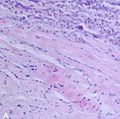Myocarditis facts for kids
Myocarditis, also called inflammatory cardiomyopathy, is when your heart muscle gets inflamed or swollen. Think of it like a part of your body getting irritated and puffy. This can happen because of an infection or other reasons.
When your heart muscle is inflamed, it can't pump blood as well as it should. This can lead to different problems. You might feel shortness of breath, have chest pain, or find it hard to exercise. Your heart might also beat in an irregular way, which is called an arrhythmia. These problems can last for a few hours or even several months. Sometimes, myocarditis can lead to more serious issues like heart failure (when your heart can't pump enough blood) or even cardiac arrest (when your heart suddenly stops working).
Contents
What is Myocarditis?
Your heart is a very important muscle that pumps blood all over your body. Myocarditis specifically affects the walls of this muscle. When these walls become inflamed, they can swell up and become weak. This makes it harder for your heart to do its job properly.
What Causes Myocarditis?
Myocarditis often happens because of a virus. Just like a cold or the flu, some viruses can affect your heart. For example, common viruses like the adenovirus or influenza (the flu) can sometimes lead to myocarditis. It can also be caused by bacteria, fungi, or even some medications. Sometimes, your body's immune system might mistakenly attack your heart muscle, causing inflammation.
How Does Myocarditis Affect Your Body?
When your heart muscle is inflamed, it can't pump blood as strongly as it should. This can make you feel very tired or weak. You might notice that you get out of breath easily, even when doing simple things. Chest pain is another common symptom, and it can feel like a dull ache or a sharp pain. An irregular heartbeat means your heart might skip beats or beat too fast or too slow. If myocarditis is severe, it can lead to serious conditions where the heart struggles to pump blood, or in rare cases, it might stop working suddenly.
How is Myocarditis Treated?
The treatment for myocarditis depends on what caused it and how serious it is. Often, doctors will recommend rest to help your heart heal. They might also give you medications to reduce the inflammation, help your heart pump better, or control an irregular heartbeat. If a bacterial infection is the cause, antibiotics might be used. In some cases, if the heart is very weak, special treatments or even surgery might be needed, but this is less common. Most people with myocarditis recover fully, especially with proper rest and care.
Images for kids
-
This image shows how a heart condition might look on an electrocardiogram (ECG), which is a test that checks your heart's electrical activity.
-
This picture shows a tiny piece of heart muscle seen under a microscope. The white arrow points to a type of white blood cell called a lymphocyte, which is involved in inflammation. The black arrow shows damaged heart muscle cells.
-
This is another microscopic view of heart tissue. It shows many eosinophils, which are another type of immune cell, causing inflammation in the heart muscle.
See also
 In Spanish: Miocarditis para niños
In Spanish: Miocarditis para niños
 | William L. Dawson |
 | W. E. B. Du Bois |
 | Harry Belafonte |




